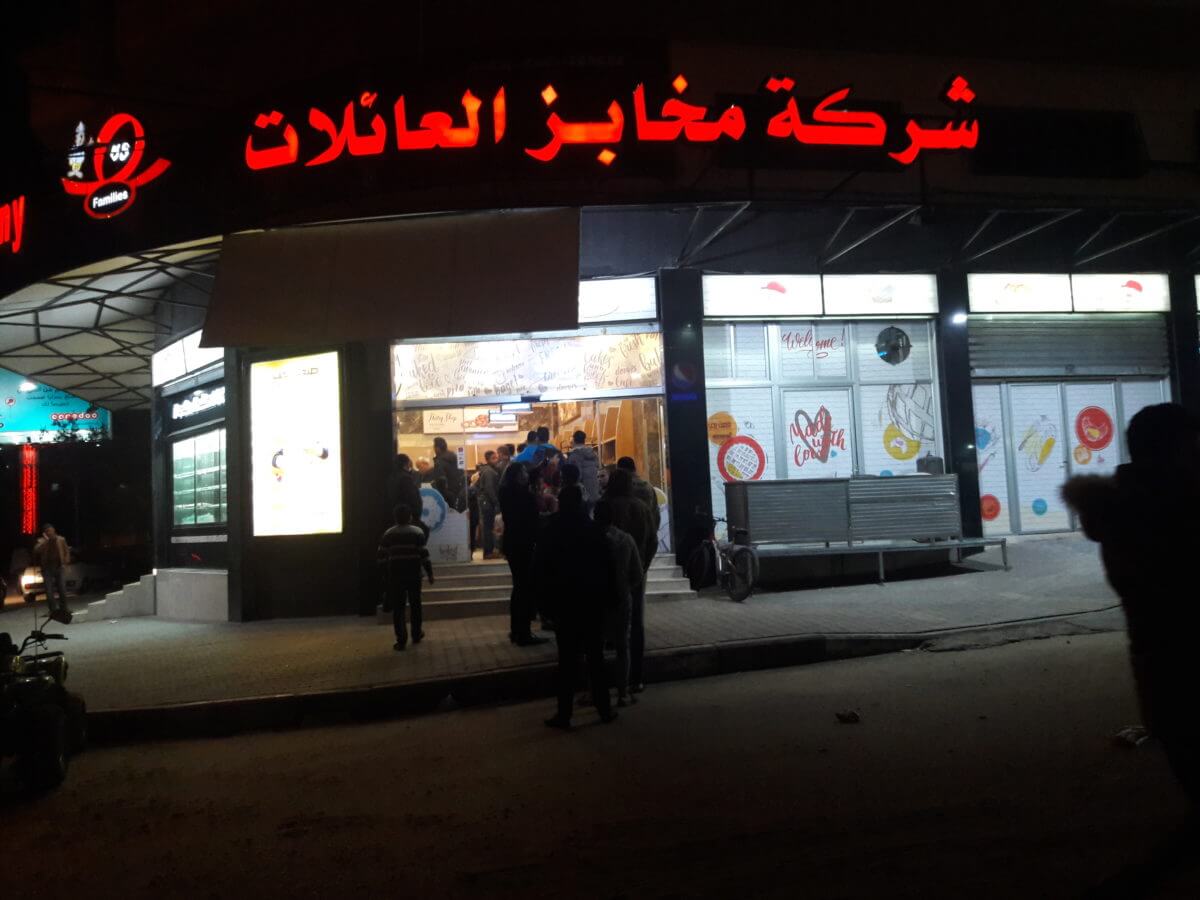Huge orange flashes were all that were lighting Gaza City Monday night as Israeli airstrikes pounded the coastal enclave, wounding eight Palestinians, including two children.
It seemed Gaza’s residents were either trying to capture the bombardments with their cellphones, or trying to calm their scared children as apartments shook from nearby bombings on several empty buildings associated with Hamas, and dozens of rockets were fired from Gaza towards Israel.
Israeli jets fired two missiles on a commercial building in the upscale Rimal neighborhood in Gaza City, which housed the offices of Ismail Haniya, the political leader of Hamas movement. This attack wounded two Palestinians, and caused excessive damage to the property and surrounding homes.
Despite reports that militant factions in Gaza have announced that Gaza and Israel had reached an Egypt-brokered ceasefire, both sides appeared to have breached the truce.
Haneen Basel, 30, mother of three sisters said that she was afraid to send two of her daughters to the school next morning “as the truce could be breached in any minute.”
“The elementary school is so close to a large Hamas training camp in western Gaza, that could be bombed without a prior warning,” Basel said, “I barely convinced them to go back to sleep due to the bombings after they were screaming hysterically all night long.”

Moving to the southern part of the city, long spontaneous queues of people were waiting out of Gaza’s biggest bakery to buy bread at midnight, a scene usually occurring during escalations.
Muzaffar Batniji, 27, shoemaker, said that his family urged him to buy 200 loaves of pita bread, “just in case of this escalation might continue for a week or more.”
“Lining up in such queues worryingly recalls the last wars on Gaza, where my family lost three cousins… every frightful thing that may come up in one’s imagination… bakeries might run out of bread for days as happened before,” Batniji told Mondoweiss.
Earlier Monday, the Israeli military said it was deploying an additional infantry brigades and an armored brigade to bolster forces around the Palestinian coastal territory, and was calling up a limited number of reservists from specialized units.
Meanwhile, Prime Minister Benjamin Netanyahu of Israel said that he was cutting short his visit to Washington, with the rocket attack posing a new challenge to his bid for re-election just two weeks before Israelis go to the polls.
The rocket attack came less than two weeks after Israel and Hamas worked to de-escalate tensions after two rockets from Gaza were fired at Tel Aviv. One struck open ground near the suburb of Holon. The other may have exploded in midair or fallen into the sea.
The Israeli daily Haaretz reported that rockets fired from Gaza overnight into the Israeli town of Sderot after the reported ceasefire went into effect and added that one home was hit causing damage but no injuries.
Gaza’s factions said that they would “adhere to the ceasefire if Israel does.”
The military escalation came after a rocket fired from Gaza struck a home in central Israel on early Monday, wounding seven.
It was the first time a rocket struck deep inside of Israel since the 2014 war between Israel and Hamas.
Israel has also waged three offensives on Gaza since December 2008, a year after Hamas took power in the besieged enclave.
The last war of 2014 severely damaged Gaza’s already weak infrastructure, prompting the UN to warn that the strip would be “uninhabitable” by 2020.
Tensions have been escalating for the past year along the Israel-Gaza fence since Palestinians began their weekly protests, during which more than 260 Palestinians have been killed. Gaza’s living conditions have grown worse because of chronic fuel and electricity shortages, compounded by an ongoing 12-year Israeli blockade, as residents have had as little as four hours a day of power for much of the last few years.
Protesters have demanded the right to return to their homes and villages in historic Palestine, and demanded an end to Israel’s 12-year blockade of the Gaza Strip, which has gutted the coastal enclave’s economy and deprived its roughly two million inhabitants of many basic commodities.



Hamas cynically rockets Israel to distract attention from anti-Hamas street protests. Bombing civilians, even Israeli civilians, is a war crime.
“The elementary school is so close to a large Hamas training camp”
Those kids are human shields cynically used by Hamas war criminals.
No problem, Hamas. Mondoweiss has your back.
Once again Israel bombs “in response to” Hamas’ actions. So much is packed into that three- word phrase, “in response to”, which only ever precedes Hamas’ actions. Time Itself begins with Hamas’ actions and is recreated with every other one. That means of course that since Hamas’ actions begin Time Itself, nothing exists before them. Hamas’ actions can never be, “in response to” anything. How many unarmed protestors were killed by snipers in the week before the Hamas bomb was launched? None, because Time Itself had not begun. Odd theory, this MSM theory of Time, that Hamas can bring it to existence with its actions and extinguish it with its inaction.
Am I the only one getting ‘false flag’ vibes from all this?
I mean, we’re told all the other rockets got shot down by the ‘Iron Dome’ but this one – just one mind – just happened to go a greater distance than almost any other resistance rocket, ever? And from very near the West Bank, where there are so many Israeli collaborators? And just so happened to coincide with the Combover’s trip to Washington and of course, the upcoming elections? Just coincidentally giving him a chance to do what is always certain to be a huge hit with the Israeli electorate, bomb an Arab city with no risk to the brave Israeli forces?
Awfully convenient, it has to be said.
The tide keeps turning; Israel must be doing something right.
In first, EU states vote against permanent anti-Israel item at UN rights council
I’ve heard and experienced first hand the misery that accompanies each of Israel’s attempts to destroy Gaza. Reading this article not only gives me flashbacks, it also reminds me of the comments of a Gazan friend working for a human rights organization.
The younger generations of Gazans (half the population of the Strip) are unique in having had no decent contact during their lives with Israelis whatsoever; hopelessness for a better future; and the belief that there is nothing left to lose by protesting Israeli occupation. That combination doesn’t portend well for the coming years.